- Equipping a Young Woman with Vital Digital Skills
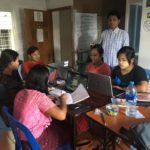
Myine is 16 years old and lives with her parents in Yangon Division. Her father is retired and her mother works as a preschool teacher. Myine aspires to one day become a teacher like her mother, however she was unable to complete Grade 11 last year and is currently out of school. Myine’s situation is not unusual in Myanmar, where only about one in five students finish secondary school, and of those who remain enrolled, only about a third are able to pass the annual matriculation exam, a prerequisite for graduation and university enrollment. Presently, Myine is searching for a job, however without a secondary school ...
- World Education hosts a Youth and Technology Forum in Yangon
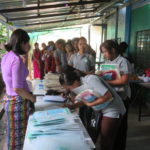
Myanmar reports high numbers of out-of-school youth, with approximately 2.7 million children between the ages of 5 and 16 years old having either dropped out of school or never enrolled. On top of that, 3.5 million adults over the age of 15 are estimated to be illiterate. As a result, a large number of young people entering the workforce do not have the necessary skills to hold a steady job or achieve success in their employment. Despite these young people growing up in the age of technology, ICT and computer skills have been highlighted by companies in Myanmar as the skills that are most lacking ...
- STRENGTHENING PEER NETWORKS FOR PERSONS WITH DISABILITIES IN MYANMAR
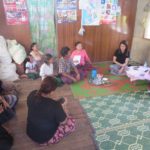
The Metta Pyoe Wai self-help group (SHG) was established in 2017 and is comprised of 11 members, all of whom are landmine survivors and persons with disabilities (PWDs) who live Kayah State, Myanmar. Three of the members are adults with disabilities, while eight are children who are represented by their family members, including mothers and grandmothers. A majority of the group’s members, including its leadership, are women. SHGs are grassroots community groups comprised of PWDs and their families, who work together to provide peer support, advocate for the rights of persons with disabilities, and volunteer in their communities. After attending a World Education leadership training, the ...
- Victim Assistance in Myanmar – A Family Matter
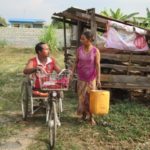
Nay Linn was 21 years old when he was forced to flee for his life as conflict erupted near his village between armed groups and the Myanmar military. Escaping by foot toward the Thailand-Myanmar border Nay Linn stepped on a landmine losing both of his legs from the waist down. 15 years later Nay Linn has since returned to Kayah State, married, and had a son, however the challenges of being a landmine survivor and amputee remain. Nay Linn refused to speak to anyone in his village and struggled to find work to support his family. As a result, Nay Linn felt depressed and isolated ...
- A Landmine Survivor’s Second Chance
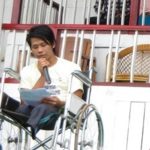
When Kyaw Ye Aung joined a World Education project in 2014, he was quiet and isolated from the rest of his village. He spoke to no one and kept to himself, a result of living with a disability from a young age because of a landmine accident. Kyaw Ye Aung, a double amputee, said, “I never talked with other people because they always looked down on me. I was afraid to talk to people and stayed at home. I tried to work by repairing TVs and videos but I did not have enough tools and repairing was difficult.” With aspirations to become more financially independent ...
- Supporting Non-Formal Primary Education in Thailand and Burma
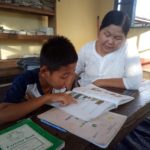
Rural, out-of-school migrant and internally displaced children in Burma and Thailand face many challenges that make it difficult to access an accredited education or staying in school. The changing political situation in Burma presents opportunities to return to home communities, but children need support to ensure a smooth transition back into the Myanmar education system upon their return. The Myanmar Literacy Resource Center (MLRC) works to promote quality education and literacy by developing literacy materials, facilitating the exchange of information and resources, and providing training for non-formal education (NFE) teachers. With PLE support, MLRC oversees the administration of Non-Formal Primary Education (NFPE) centers of education in ...
- Teaching Science using everyday items
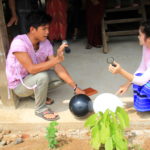
The Karen Refugee Committee-Education Entity (KRC-EE) promotes improved access to quality education services for refugees from Burma. KRCEE administers both basic education (separately funded) and higher education, through the Institute for Higher Education (IHE) in six of the nine camps. During a needs assessment at a workshop in October 2016, IHE science teachers told us that they hadn’t had the opportunity to learn about conducting experiments. They also told us that they didn’t have many materials to use for experiments in their low resource settings. Furthermore, the textbooks they use had gaps in content and some were misprinted so that the students couldn’t see the diagrams clearly. ...
- WIDE HORIZONS ENABLING YOUTH LEADERSHIP
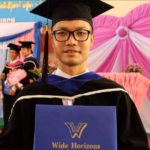
Community based organizations (CBOs) on the Thai-Myanmar border have difficulty finding skilled local staff which makes it a challenge to successfully carry out activities. They require dedicated, energetic staff that can implement plans, document and report on activities, and raise support and funds for their work. At the same time talented young adults from these same communities have limited access to higher level education where they can develop the relevant skills to access employment, including working for these CBOs. Supported by the USAID-funded Project for Local Empowerment (PLE) education partner Wide Horizons Community Development Program annually trains young adult staff in advanced community development, English language and ...
- Eastern Burma Community Schooling Enabling Ethnic Engagement in Education
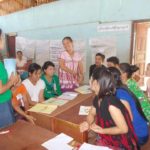
In under-served and conflict-affected areas of Southeast Burma, communities have developed local level education systems for their children. However, challenges remain for community teachers in obtaining adequate in-service and professional development support, and for community-based actors to engage in national level education planning. The Karen Teachers Working Group (KTWG) works to increase access to education for vulnerable populations in the region. Through the Project for Local Empowerment they provide training and support to teachers in schools with the Mobile Teacher Training (MTT) program. KTWG’s MTTs been providing in service training for Karen teachers since 2001. MTT’s visit teachers in their schools, observe their classroom practices and ...
- Youth Connect Helping Children to Stay in School
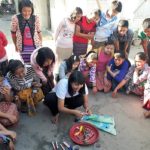
Communities on the Thailand-Burma Border are particularly vulnerable to labor exploitation and trafficking. Once children reach middle school age they often drop out in order to work, increasing their vulnerability to these risks. Youth Connect’s Stay in School (YC-SiS) Life Skills program seeks to support vulnerable children to continue their education. It was founded in 2012 with support from the Project for Local Empowerment (PLE) through World Education. The main goal of the program is to reduce school drop-out rates and increase future opportunities for young people through the provision of Life Skills and Civic and Community Services training. The Life Skills program started in the Mae Sot area with ...
